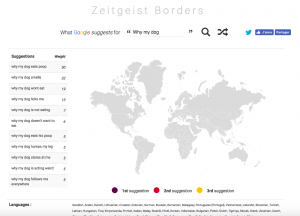Zeitgeist Borders is a search engine that allows for users to distinguish what others are looking for on Google at a given point in time and cultural contexts.

Google’s autocomplete technologies serve to make the human- computer interaction more efficient by attempting to predict the word or sentence a user may input after only a few characters have been typed into a text input field.
Antoine Mazièrez states that “[w]hile past searches, account preferences and browsing interests differ for every individual logged user, location- specific suggestions is the only universal discriminant for suggestions, whether the user is logged in or not. Several measures allowed us to establish which elements are used by Google to perform such content discrimination: the public IP that originated the request and the “hl” (which stands or Human Language) parameter passed along with the query that express which language the user is commonly using.”

If you’d like to test it out Antoine Mazièrez’s project for yourself explore this link: https://zeitgeist-borders.antonomase.fr/?q=Why%20my%20dog%20
Mazieres, A. (2016). Georgraphical projection of Google's suggestions diversity. In 3rd GESIS Computational Social Science Winter Symposium.